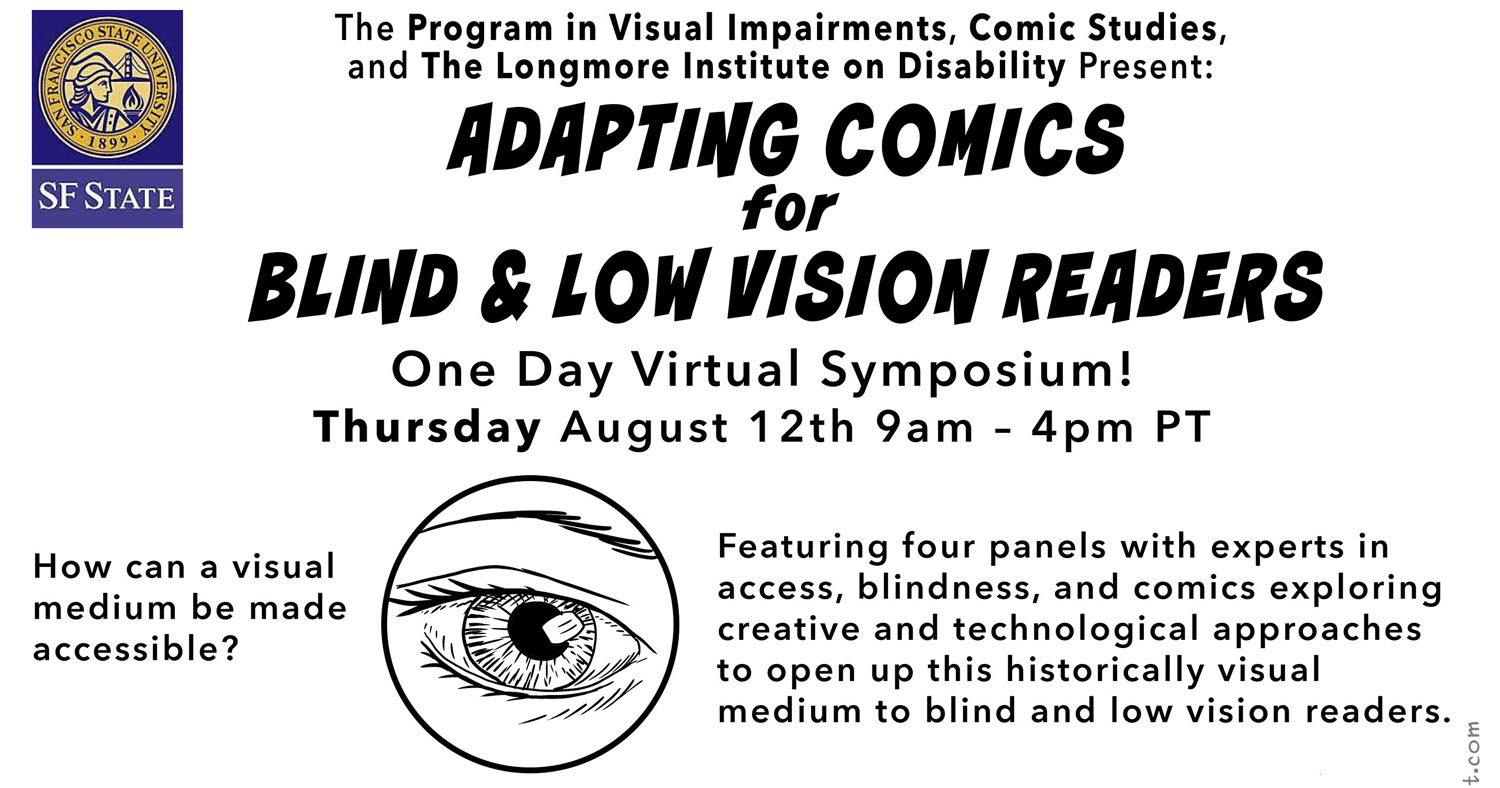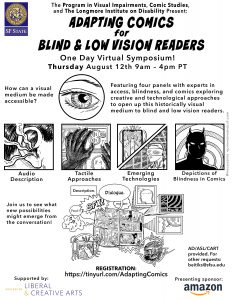A short update with news of an event I’m cohosting this week!
First, a couple of recent podcast interviews. Back in June, I spoke with Mike Hanson for his show the Well Read Investor and we had a good conversation about how I came to do this work and thoughts about comics in education. That’s available here. I’m not sure if what I had to say will help anyone with their investments, but I had fun talking with Mike! And then, in August, I spoke with Tyler Weaver for his literary podcast the Parenthetical Recluse on a wide swath of topics from my process, to teaching approach, to what I learn from my children. Gave me a lot to think about and make connections – which I always appreciate. That’s all available here.
This Thursday August 12, I’m co-hosting an event on Adapting Comics for Blind & Low Vision Readers. It spins out of a smaller event my San Francisco State University colleagues and I did back in March, the overwhelming response to that event, made us move quickly to organize this more comprehensive conversation featuring four separate panels on this day-long symposium over zoom.
A tiny bit of backstory – back when I was working on Unflattening as a dissertation and teaching my first comics courses, my mission in all of that was about bringing access to difficult ideas and education – but I was aware that this turn to visual media left some people out entirely. Sometime in there, I saw a couple things about comics made for blind readers, most notably Ilan Manouach‘s Shapereader. From that point on, I started compiling resources related to this as I’d happen upon them. When I ended up at SFSU, at my new faculty orientation, I met Professor Yue-Ting Siu (Ting) who was about to start teaching in the Program for Visual Impairment. We struck up a conversation about comics and accessibility and sometime later she came and spoke to my visual communication course, helping us think about ways to make the visual accessible to blind/low vision readers. We kept up a conversation over the years since getting hired, and then last fall, some of my masters students who are working in comics ended up having to think about accessibility for their visual work. The solutions are pretty simple – some minor description will satisfy university requirements, but I saw this as less of a headache and more as an opportunity. In my experience, I’ve seen so few attempts at making comics accessible to this audience, and nothing in the way of standards for it. So I thought, maybe we can try some things with that. Ting and I applied for a small university grant to explore this more, and we ended up receiving it. We brought in Professor Emily Beitiks of SFSU’s Longmore Institute on Disability, and started hatching up ideas.
We planned a small informational session for ourselves and interested students in March, and a week before the event, decided to open it to the public to see if we could get a few other voices in the conversation. 800 people ended up registering and it was a great conversation – that left all of us inspired and full of ideas of where to go from there. (This event was recorded and up on my site here along with all the resources I’ve compiled on blind accessible comics.) Next step was to orchestrate a larger conversation, and that’s what we will be doing on August 12. This time we’ll have four separate panels focusing on Audio, Tactile, and Emerging Technologies, and Depictions of Blindness in comics. We have a great range of blind and sighted creators, educators, and scholars scheduled for the day. Registration https://tinyurl.com/AdaptingComics and panelist info and the detailed scheduled are posted here: https://docs.google.com/document/d/11hIqrMJ75YuLtUXbWf1CoxZstIVTf4k-1AleqXj3DpU/edit?usp=sharing
Comics are currently a dominant force in popular culture, while simultaneously being increasingly recognized as a significant means for supporting literacy and a valuable tool for education in the classroom. Stories told in their pages often promote diversity and chronicle the lives of the marginalized, and yet the form itself completely leaves out the visually impaired audience. With the mass popularity of comics, the industry is in dire need to find ways and set stand standards to create better access to comics for blind and low vision readers.
9:30-10:45am PT. Panel 1, Audio Approaches to Accessible Comics
11am-12:15pm PT. Panel 2, Tactile Approaches (2.5D and 3D) to Accessible Comics
12:15pm-1pm PT. Lunch!
1pm-2:15pm PT. Panel 3, Emerging Technologies: Haptics and Screen-Based Approaches
2:30-3:45pm PT. Panel 4, Depictions of Blindness in Comics
3:45-4:15pm PT. Keynote and Closing



